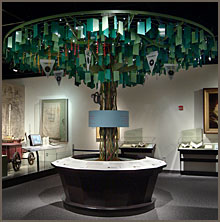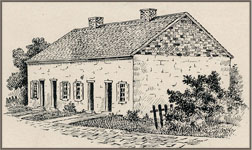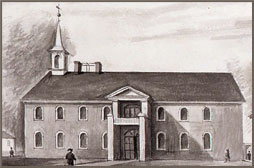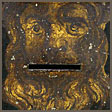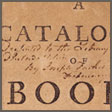|
Franklin College Brew House, late 18th century

The Old Academy Buildings in 4th Street as originally constructed, ca. 1830
|
 |
 |
 |


The noblest question in the world is
What Good may I do in it?
—Poor Richard’s Almanack, 1737


Franklin placed great value on self-improvement. He believed that integrity and moral responsibility were the backbone of a successful life and a strong community. He examined his own behavior frequently and, at one point, outlined 12 virtues that needed his attention: temperance, silence, order, resolution, frugality, industry, sincerity, justice, moderation, cleanliness, tranquility, and chastity. A Quaker friend suggested a 13th—humility—but Franklin admitted: “I cannot boast of much Success in acquiring the Reality of this Virtue; but I had a good deal with regard to the Appearance of it.” Franklin struggled throughout his life to live up to these ideals.
As a lifelong learner, Franklin taught himself to read French, German, Italian, and Spanish, on top of the Latin he learned as a child. To help others educate themselves, he and his fellow Junto members founded the Library Company of Philadelphia, America’s first subscription library, and the University of Pennsylvania, America’s first nonsectarian college. Franklin believed that, above all, education should be useful, with an emphasis on character, hard work, and bodily and spiritual health.
|
